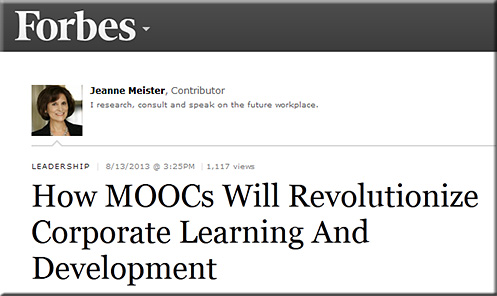Twitter buys open source training company Marakana to power new “Twitter University” for engineers — from techcrunch.com by Ingrid Lunden
Excerpt:
Twitter today announced its latest acquisition, along with a move into offering richer resources to attract better engineering talent to the company. It has bought Marakana, an open-source technical training company; and in turn, Marakana will be the force behind a new effort called Twitter University. School mascot: a blue bird, not a whale.
From DSC:
I’ve asked from time to time if the corporate world would develop their own MOOCs…
I’ve suggested that if higher ed doesn’t get much more responsive to the needs of business — as well as to our government — alternatives may likely crop up….
…so I can’t help but wondering if this isn’t an example of that very type of thing occurring (i.e. the corporate world developing alternative paths to getting what they need).
It may not be MOOCs, but disruption will occur one way or another if higher ed doesn’t experiment and innovate with a much greater degree of intensity and fervency. We need to be far more responsive!
The items in this posting are a great illustration of why I call this blog, Learning Ecosystems — how we learn and what we learn about is an ecosystem — both individually and corporately. We have self-organizing systems for learning that constantly change — involving people, institutions, technologies, and more. Very few things are staying in place/the same these days — and the very pace of change has changed. If we were to look at our learning ecosystems through a gigantic “microscope”, the organisms and nodes would be very active these days!
Also see:
.
.
Excerpt (emphasis DSC):
To fix its problem, McAfee turned to a concept sweeping the education scene: Massive Open Online Courses, or MOOCs. By using a tenet of MOOCs called “flipping the classroom,” which means that the majority of learning happens not with a professor lecturing the students but by giving students access to course materials and having them probe, discuss, and debate issues with fellow learners as well as the professor. With that change, McAfee turned its training around in a way that both saved both time and produced more lucrative sales: its sales associates now attribute an average of $500,000 per year in sales to the skills they learned through the new training model.
…
But as MOOCs storm the academic world, the public discussion of their impact is ignoring what could become their most valuable application. Far from being limited to higher education reform, the new learning style’s most important legacy could be its impact on the world of corporate training – which is a $150 billion industry.









